- BRACED (or BRASED)
- Alternative terms to interlaced – see interlaced.
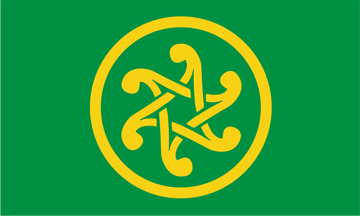
Flag of the Panceltic Movement
- BRACELET
- An alternative heraldic term to barrulet – see barrulet.
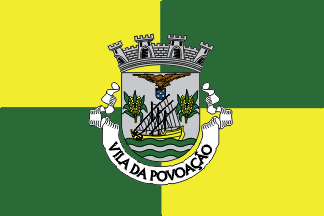
Flag of Água Retorta, Portugal
- BRAG FLAGS
- In largely US usage, the colloquial term for a collection of local flags,
often (but not invariably) unofficial flags, that has been amassed by the owners
of pleasure vessels to indicate the number of ports visited – a type of
souvenir flag.
- BRANCH OF SERVICE FLAG
- 1) Generically, one of those flags pertaining to a particular branch within the armed services
– an air force flag, army flag, navy flag, flag of the marine corps or similar
(see also armed services flag).
- 2) Specifically in US military usage, as above but the term may also include the flags of each
specialization within a particular branch – for example the flag of the Engineering Corps.
![[branch of service flags]](../images/v/vx-us^nv.gif)
![[branch of service flags]](../images/v/vx-gb-army.gif)
![[branch of service flags]](../images/v/vx-gb^rm.gif)
Navy Flag, US;
Army Flag, UK;
HQ Flag of the Royal Marines, UK
- BREADTH
- 1) Generically see width.
- 2) Specifically in now largely (if not entirely) obsolete British Royal Navy usage, a term
for indicating the width of flags – see the notes below (also bunting 1)).
![[breadth]](../images/v/vx-gb_1707r.gif)
![[breadth]](../images/v/vx-gb_1750r.gif)
![[breadth]](../images/v/vx-gb_1822.gif)
Ensign of 20 Breadths x 11 yards
(10.10 m), 1707;
Ensign of 18 Breadths x 8 yards (7.20 m), 1742;
Ensign of 23 Breadths x 34 feet (10.40 m) 1822*, UK (CS)
* In 1822 this particular size was officially listed.
Notes
a) With regard to 2) this term describes one half of the width of bunting formerly employed in
manufacture/calculation, with the width of such flags being expressed as a multiple of the number of
breadths used.
b) The width of a breadth was recorded as being 11" (27.94 cm) in 1687, had become 10"
(25.41 cm) by 1742, and had shrunk to its present size of 9" (22.84 cm) by the end of the 18th
century, with a yard (18" or 45.72 cm) of fabric being used per breath employed thus giving a
ratio of 11:18 in 1687, 5:9 in 1742 and 1:2 by 1800.
- BREAK A FLAG (BREAK OUT A FLAG or BREAKING)
- (v) To unfurl a flag that has been hoisted folded and rolled up in such a
manner that a sharp tug at the halyard will cause it to fly free (see also
furl and halyard).
Please note the above is often used to mark the beginning of an event or the arrival of a VIP.
- BRETESSED
- An alternative heraldic term to embattled – see embattled.
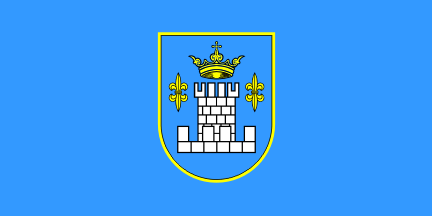
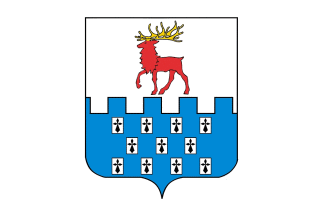

Flag of Koprivnica, Croatia;
Flag of La Mézière, France;
Flag of Tržič, Slovenia
- BRITISH-STYLE ENSIGN
- See blue ensign 3), red ensign 3) and
white ensign 3)
(also canton flag and ensign).
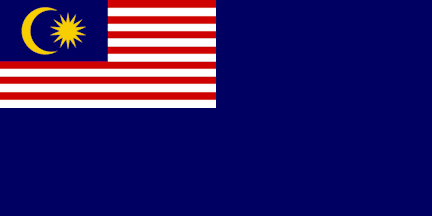
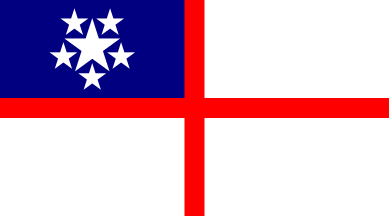
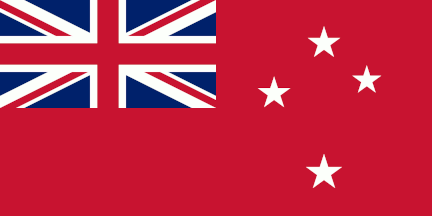
Government Ensign of Malaysia;
Naval Ensign of Myanmar 1947–1974;
Civil Ensign of New Zealand
- BRITISH COLOUR CODES (BRITISH COLOUR COUNCIL REFERENCE CODE or BCC)
- A now largely obsolete standard numeral colour code for cloth and flags established by Britain,
and first published in 1934 (see also Pantone Matching System).
- BRITISH (or BRITAIN) FLAG
- The original names for the 1606 pattern British union flag – the Britain flag or flag of Britain –
but see
His Majesty’s Jack (also
interlaced,
james union and
union jack).
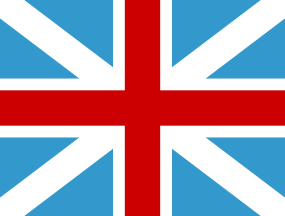
Union Flag 1606–1801, UK
-
Please note, evidence suggests that the terms
British and Britain flag or flag of Britain ceased in official use after 1639.
- BROAD COMMAND PENNANT
- In US naval usage now increasingly (if not entirely) obsolete, a pennant that
is flown at the main masthead in place of the commission (or
masthead) pennant to indicate the presence on board of an officer commanding a force, group or squadron
of vessels (or carrier air wing), and who has authority over any officer flying a burgee command pennant,
but who has not reached flag rank – see
burgee command pennant (also
broad pennant 1) with its following note,
command pennant,
flag officer 1) and
masthead pennant).
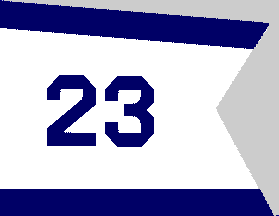
Broad Command Pennant, US (seaflags.us)
Please note however, that the US practice of displacing the commission (or masthead) pennant by the
burgee or the broad command pennants differs from general naval practice where the various command
pennants (excepting the broad pennant) are usually (but not invariably) flown in addition and subordinate
to the masthead pennant.
- BROAD PENNANT (or PENDANT)
- 1) Generically, a shorter and broader form of the masthead pennant, the
fly of which is cut into a swallowtail – a triangular or tapered swallowtail.
- 2) Specifically in British RN and some other usage, a pennant as in 1)
above that is flown at the main masthead in place of the commissioning (or
masthead) pennant to indicate the presence on board of an officer with the
rank of Commodore (see also
broad command pennant,
burgee command pennant,
flag of command and
masthead pennant 1)).
- 3) In civil maritime usage, as 1) above (and often patterned after the
relevant club burgee), a broad pennant is sometimes flown by the commodore and
vice-commodore of
a yacht or boating club – an officer’s, flag officer or yacht officer's broad pennant
– but see officer’s flags and
officer’s pennants
(also burgee and
deface).
- 4) A (usually) longer version of 1) above, sometimes with rounded points (or a lanceolate fly)
and flown from the main masthead to mark the presence aboard ship of a head of
state or member of a royal family – a royal or monarch’s broad
pennant and others (see also lanceolate
and royal masthead pennant).
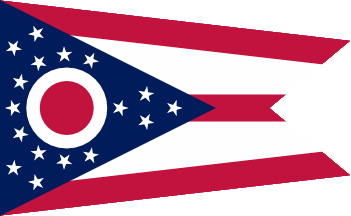
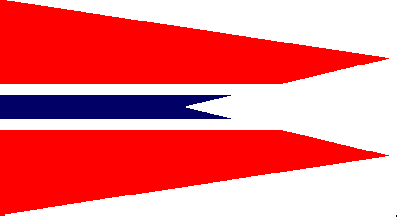
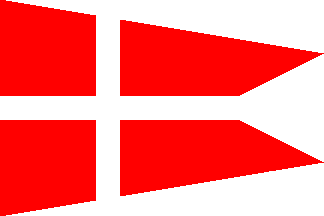
Flag of Ohio, US;
Commodore’s Broad Pennant, Norway;
Orange Lake Ice Yacht Club, US
Please note, that in the US Navy and some others the rank of commodore
– to which the broad pennant belongs – has been superseded by that of rear
admiral (lower half) and the pennant accordingly replaced by an appropriate
flag of command (see also broad command
pennant, flag of command 1)
and in abeyance).
- BROD
- A Scottish term, now obsolete, for a flag hanging from a crossbar – a gonfalon
(see gonfalon).
- BROKEN CROSS
- See swastika
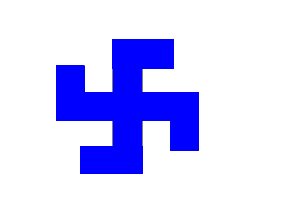
Former House Flag of The Iceland Steamship Co Ltd 1914–c1943
- BRUNATRE
- A heraldic term for the colour brown (see also mixed tinctures).
![[colour example]](../images/v/vxt-d555c.gif)


![[branch of service flags]](../images/v/vx-us^nv.gif)
![[branch of service flags]](../images/v/vx-gb-army.gif)
![[branch of service flags]](../images/v/vx-gb^rm.gif)
![[breadth]](../images/v/vx-gb_1707r.gif)
![[breadth]](../images/v/vx-gb_1750r.gif)
![[breadth]](../images/v/vx-gb_1822.gif)













![[colour example]](../images/v/vxt-d555c.gif)